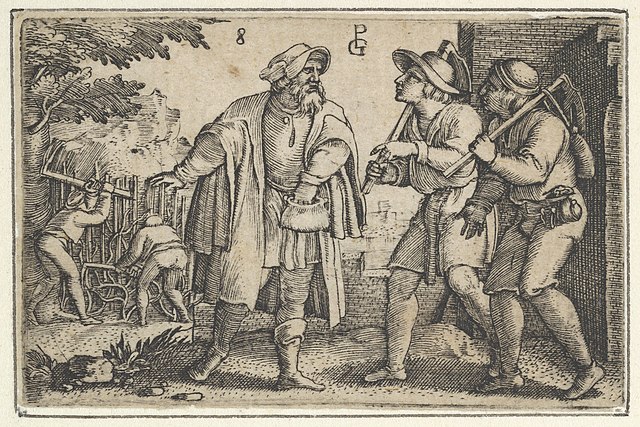A sermon for the parish of Stanningley and Swinnow, Sunday 1 October 2023
Text: Matthew 21:23-32
The context of this sermon preached in two churches was the parish has just gone into vacancy, i.e. their vicar has left and they await a replacement
Today as I turned over a calendar to the page for October, I found a beautiful photo of a Scottish woodland in all its autumn splendour. A reminder, if we needed it after this week’s storm, that autumn is upon us. A season of change, and also a season of preparation. What are you preparing for, I wonder? Perhaps already shopping early for Christmas, or booking a holiday for next year, or looking forwards to a family wedding in the spring? As a church, no doubt you’re already planning your Advent and Christmas activities.
Our Gospel reading today refers to John the Baptist. I have a particular fascination with John, because he’s my patron saint – my birthday is 24th June, John’s feast day in the church. John’s catch phrase seems to have been ‘Prepare the Way for the Lord’. When he baptised people, it wasn’t just as a sign of their repentance for sin, it was also a sign that they were being cleansed as a preparation for a special event, the coming of the Messiah, which would be a great upheaval to their whole way of life.
This was something that challenged the Jewish leaders – the ‘chief priests and elders’ referred to in the Gospel were the Sanhedrin, the religious court. They knew that they hadn’t given permission to John to baptise people, and neither had they given permission to Jesus to heal people, or for that matter to drive the moneychangers out of the Temple, which is what brought them to challenge him on this occasion. Jesus cleverly asks them their opinion of John, because if they weren’t prepared to admit that John was a true prophet, then they clearly wouldn’t accept Jesus either.
If John’s catchphrase was ‘Prepare the Way for the Lord’ then one of Jesus’ catchphrases was certainly ‘the Kingdom of God is among you’. After Jesus refuses to answer the Sanhedrin’s question, he goes on to tell three short parables to make his point about the Kingdom of God. We just heard the first of them today: A man had two sons; he went to the first and said, “Son, go and work in the vineyard today.” He answered, “I will not”; but later he changed his mind and went. The father went to the second and said the same; and he answered, “I go, sir”; but he did not go.

The Parable of the Father and His Two Sons in the Vineyard by Georg Pencz, C16
(c) Creative Commons
As you may know already, the vineyard was a widely used image to represent the Jewish people, and its owner is obviously God. Jesus was clearly saying that there are some people who made no claim to being obedient servants of God, yet who actually do his will, while others claim to be obeying God, but don’t in practice. The men from the Sanhedrin, and everyone who was listening to this conversation, would see that he was having a go at them, the religious leaders, for being like the second son and not practising what they preach. And they’re forced to admit this by saying that the son who actually worked in the vineyard did what his father wanted, rather than the one who promised and didn’t deliver.
When Jesus gives this interpretation, though, he adds insult to injury by saying those who are really doing God’s will are ‘tax collectors and prostitutes’ – whose lives are clearly contravening Jewish religious laws.
Recent scandals in Christian churches of all denominations have certainly given the lie to any idea that religious leaders are necessarily holier than the rest of us. But beyond that, what does this short parable have to say to us today?
Jesus’ reason for challenging the Sanhedrin leaders on this point was, I think, to make a contrast between their view and his own on where true religion is to be found. These were men whose whole lives were bound up in the activities of the Temple and the religious and political life of Jerusalem. They probably rarely left the city. To them, keeping Temple worship going according to tradition was the most important way of showing their obedience to God.
By contrast, John the Baptist exercised his whole ministry in the desert and in the Jordan valley where he baptised. Jesus had spent most of his ministry in the fishing villages on lake Galilee and farming communities in the hills, as well as in the crowded streets of Jerusalem. Their disciples were ordinary folk, and among these ordinary folk Jesus could see the seeds of the Kingdom that John had sown already taking root and growing. People who had taken John’s message of repentance and preparation to heart, were listening to Jesus’ teaching, and putting it into practice.
These new disciples, these sons of the vineyard owner who were finally doing what God wanted, are summarised provocatively as ‘tax collectors and prostitutes’. But Jesus also ministered to fishermen, shepherds, disabled people and a divorcee shunned by society. I suggest that we can take these taxmen and sex workers as representing two groups in society – those who are engaged in the business of the world with no time for the church, and those on the margins of society, unable to participate in the regular economy and forced to live in unconventional ways. What you find, now as well as then, is that the overworked people often have an unsatisfied hunger for meaning in their lives, which only Jesus can address. And that people on the margins of society are often the kindest and most generous people, their ears attuned to God’s Spirit.
Jesus, unlike the religious leaders, recognised that out in the streets and villages, not in the Temple, was where God was actually at work changing people’s hearts and lives.
Therefore, I can see that there are two challenges in this passage that are as relevant today as they were in Jerusalem two thousand years ago.
The first is a personal challenge to each and every one of us, including myself. I’m assuming (but please forgive me if I’m wrong) that everyone here was either baptised or confirmed as a teenager or adult. In which case, we have all made some promises about obeying God. When I was confirmed in 1981 it was three short phrases: I turn to Christ, I repent of my sins, I renounce evil. In the current service book, it’s a bit wordier with two sets of promises: I reject the devil and all rebellion against God, I renounce the deceit and corruption of evil, I repent of the sins that separate us from God and neighbour; and then: I turn to Christ, I submit to Christ, I come to Christ. As a lay minister I had to make further promises to be obedient to the Lord Bishop of Leeds, and to be ‘a worker for Christ for the good of his Church and for the spiritual welfare of all people’.
Having made these promises before the congregation, and maybe before the Bishop, we are like the first son who promised to go and work in the vineyard. The question is, do we? In my everyday life, do I actually and actively turn to Christ to direct the way that I should live, and submit to him in doing what I know he wants of me? That’s a question for each of us to answer for ourselves.
The second challenge is to the Church as a whole and to each local congregation. And it’s particularly relevant to you here at St Thomas’s and Christ the Saviour, as you go into the vacancy following Richard’s departure. A vacancy in the benefice, with key people missing, can all too easily become a time of doing as little as possible, of keeping things going as they are, of focussing on church activities.
Instead, I would encourage you to see this as a time of preparation. Just as autumn is a time of preparing for the new year ahead, just as people went out into the desert to hear John the Baptist and his message of preparing for the coming Messiah, and as Jesus himself after being baptised spent forty days in the desert preparing for his ministry on the margins of society, so this time in the wilderness of a vacancy can be a time to prepare for a new leader and for a new outpouring of God’s Spirit in this parish. This is a time to come together as a community of lay people, as John’s disciples were, and re-commit yourselves to hearing God’s call to minister to the ordinary folk of this area.
You will be preparing a parish profile for the Bishop to find a suitable minister, and that will include both your current activities and future aspirations. I can see from your website and Facebook group that you are not starting from scratch here. You are already engaging with the community through the Mums & Tots and Chat & Craft groups, fellowship lunches, the Friends of St Thomas’s and the various uniformed organisations. All that, no doubt, will go into the profile. But what else might be possible? Where, figuratively speaking, are the tax collectors and prostitutes in Stanningley: the busy people and the people on the margins in our parish, who may not yet have heard of the Kingdom of God but who will enter it gladly and obediently when they do?
I hope I will see you again during this vacancy, and pray that it will not be long before God calls the right woman or man to serve as your parish priest. But now, and then, you will not be acting alone. It is the work, not of the Church but of Christ himself. I will finish with a quote from the last verse of the New Testament reading for today. Philippians 2:13. ‘For it is God who is at work in you, enabling you both to will and to work for his good pleasure.’ The ideal son is the one who both promises to work in God’s vineyard, and with his Father’s help, does so. Amen.





